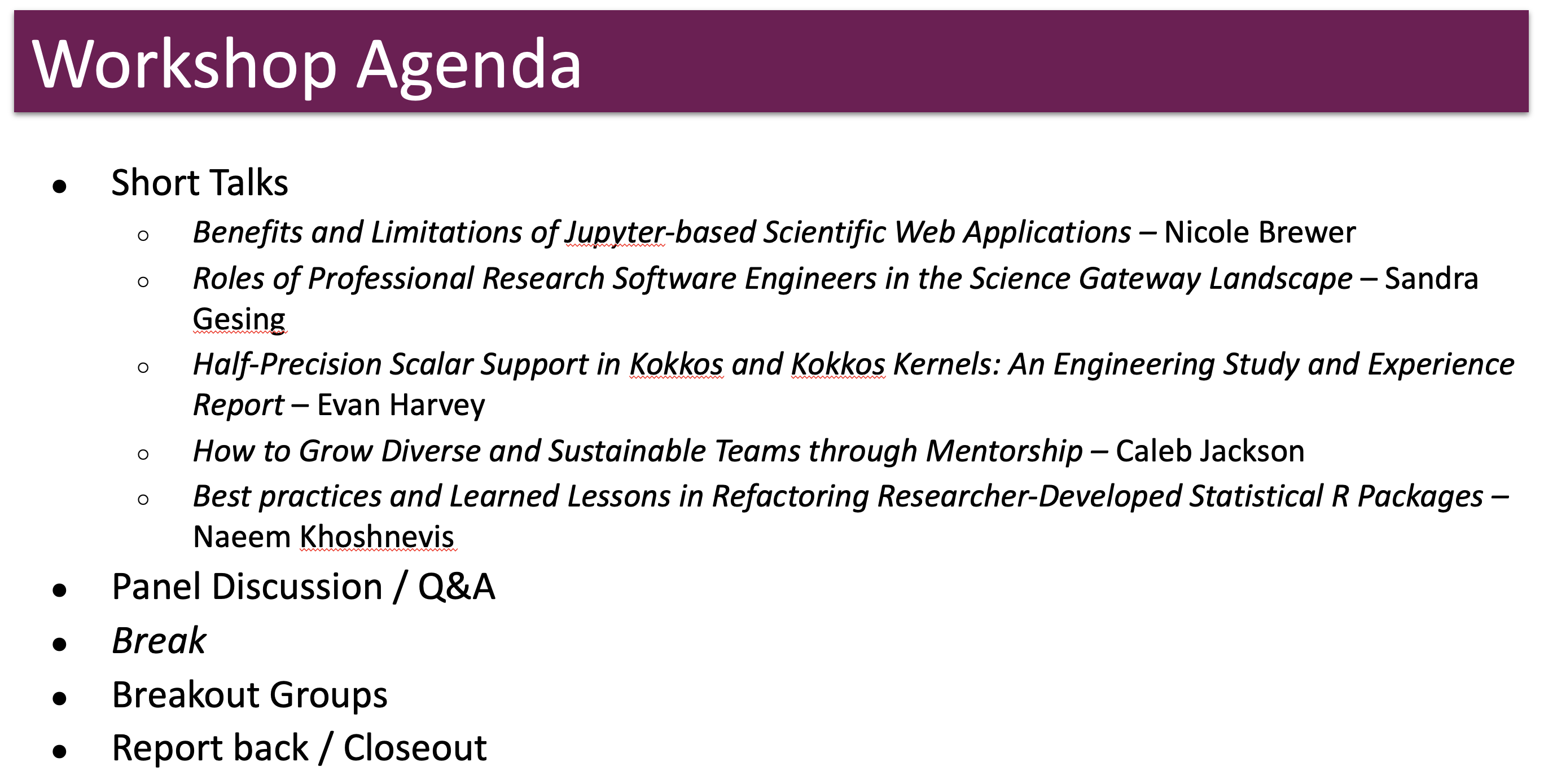Report: Research Software Engineers in eScience 2022 Workshop
Published: Jan 17, 2023
The US-RSE Outreach Working Group hosted the first RSEs in eScience Workshop as part of the 18th International Conference on e-Science in Salt Lake City, UT.
Introduction
In October 2022, US-RSE hosted the first ever Research Software Engineers in eScience Workshop as part of the 18th International Conference on e-Science in Salt Lake City, UT, USA. The theme of this inaugural workshop was “Stories of Application of RSE Expertise to Scientific Research.” Potential speakers were encouraged to submit their stories about RSE solutions in eScience, RSE contributions to software sustainability in eScience, the RSE perspective on an eScience contribution, the non-RSE perspective of collaboration with RSEs in eScience efforts, and more.

The workshop started with five short talks by Nicole Brewer, Sandra Gesing, Evan Harvey, Caleb Jackson, and Naeem Khoshnevis (see the agenda for full details and slides from the presentations). Topics included diversity, equity, and inclusion; experience reports on engineering for half-precision scalar support; and the pros and cons of Jupyter notebooks in scientific applications.

Breakout Discussions
Following the presentations, participants split into breakout groups to discuss two main topic areas: (1) Research challenges, concerns, and successes; and (2) Human factors challenges, concerns, and successes. The participants were given the following instructions:
- Goal: Identify avenues for improvements, research, or tips/actions that can resolve common problems
- Directions: Brainstorm big topics of concern, challenges, or successes. Discuss one or several.
- Report back: Identify a representative to report back on the conversation for the group.
Research
Participants: Evan Harvey, Reed Milewicz, Naeem Khoshnevis, Gregory Kell, Rosa Filgueira, Addi Malviya-Thakur, Lorcan Pigott-Dix, Rual Alejandro Vargas Acosta, Luis Antonia Garnica Chavira
The participants in the “Research” breakout discussion focused on three topics: (1) understanding each other; (2) dedicated and follow-on funding; and (3) developing tools is a form of research. In summary:
- RSEs have to learn the vocabulary of the domain. Being able to become conversant in other domains is one of the core strengths of RSEs.
- There’s not a lot of dedicated funding streams for RSEs, and RSEs frequently lack institutional support. Establishing explicit organizational groups for RSEs can help, as can creating more funding streams specifically for RSEs and their work. There also needs to be an avenue to provide funding for continuing training and career growth for RSEs.
- The work that RSEs do is just as evidence-based, innovative, and novel as the work of domain scientists. Developing tools, supporting research software development, etc., is intellectually demanding, and RSEs also develop new algorithms that in turn drive the research software. This is an intimate part of domain research. RSEs deserve credit and respect for the work that they do, so making sure that RSEs and their work is cited and recognized is key.
Human Factors
Participants: Sandra Gesing, Ian Cosden, Julia Schneider, Caleb Jackson, Daniel S. Katz, Carol Song, Nicole Brewer
The participants in the “Human factors” breakout discussion focused on three topics: (1) RSE personalities; (2) project and community managers; and (3) fitting RSEs to projects. In summary:
- RSEs have a unique combination of strengths and personality traits within research and science: capacity for and interest in research, open personality, and ability to converse with multiple types of stakeholders and collaborators (e.g., research scientists, end users, librarians). This can make them like translators.
- Project and community managers for RSEs are generally missing or underrepresented at institutions. Most of an RSE’s instructions may come from a project lead who knows what they want to have solved, but this person is normally not the project manager or technical leadership for the RSE. There is also a need for these managers, who are able to understand the scope of work RSEs do and able to navigate the complexities of sustained funding for that type of work.
- There is a nuance in pairing RSEs with a wider group of computational science and engineering teammates. While there has been little formal research in this, RSEs have found that there is a definite art to finding a place where they both fit the work that needs to be done and fit the culture of the team. There will only be success when both of these are present. This leads to questions about how to structure interviews and intake interviews for RSEs.
Future Steps
The 19th International Conference on e-Science takes place October 9-13, 2023, in Limassol, Cyprus. The US-RSE Outreach working group intends to submit a proposal for this conference, ideally with more international organizers and program committee members.
Acknowledgements
We want to say a special thank you to the four members of the organizing committee:
- Miranda Mundt, Sandia National Laboratories, USA
- Ian Cosden, Princeton University, USA
- Lance Parsons, Princeton University, USA
- Daniel S. Katz, University of Illinois at Urbana-Champaign, USA
We also want to thank the program committee:
- Richard Abdill
- Nasir Eisty
- Dan Gunter
- Rafael Mudafort
- David Nicholson
- Joshua Teves
Sandia National Laboratories is a multimission laboratory managed and operated by National Technology & Engineering Solutions of Sandia, LLC, a wholly owned subsidiary of Honeywell International Inc., for the U.S. Department of Energy’s National Nuclear Security Administration under contract DE-NA0003525.